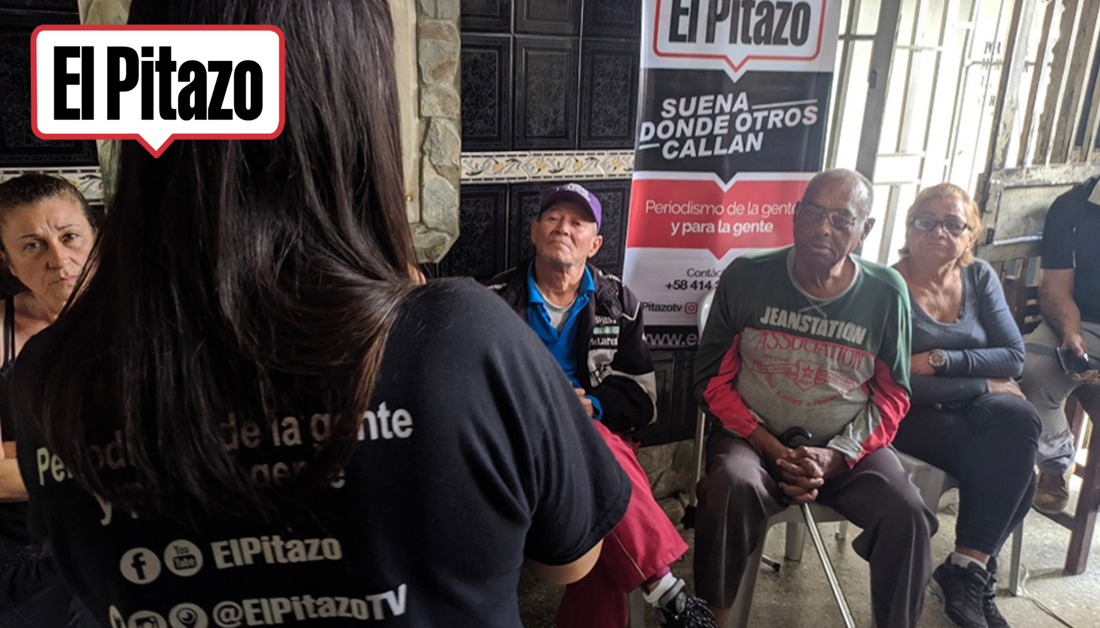Local Journalism Project Case Study: El Pitazo (Venezuela)
The backstory:
El Pitazo (“The Whistleblower”) emerged out of the need to fight censorship and bring information to the most deprived segments of the public in Venezuela. Founded in December 2014, it started as a YouTube channel, but progressively expanded. Today it broadcasts multimedia content through a radio show (on open and digital signal), SMS, Twitter, Facebook, Instagram, WhatsApp, Telegram, and four newsletters. The El Pitazo website records a million visitors every month.
As with all independent media in Venezuela, El Pitazo and its staff have been subjected to physical and cyber attacks, as well as legal threats by political leaders and businessmen.
In 2019, they won the prestigious Ortega y Gasset Award (Spain) and the Gabo Award from the the Gabo Foundation – an institution created in 1995 by journalist and Nobel laureate Gabriel García Márquez. They were also selected for the Velocidad Fund, a one-year-long media accelerator program that helped them to implement their membership model.
Audience:
El Pitazo reports 3.5 million monthly views on its web page and 12,341 newsletter subscribers. They have a large social media following, with 430,000 followers on Facebook, nearly 1 million on Twitter and Instagram, and close to 12,000 on Telegram. They have reached more than 18,000 people since they started conducting WhatsApp chat forums and have 6,000 readers in WhatsApp groups.
Value proposition:
El Pitazo aims to inform a wider audience outside big cities who have less access to reliable digital connections. It has correspondents in almost all regions of Venezuela and though it is positioned as a generalist news outlet, it focuses part of its reporting on local stories using 11 content distribution channels. The outlet’s strategies to reach disconnected communities are innovative: flip-charts pasted on walls; two-minute news briefs before a movie show; and live chat forums through WhatsApp. They also employ performative journalism, producing plays that tell investigative stories already in the public domain or dramatizing their own investigative reporting so that it can reach a wider audience.
The team:
El Pitazo has a staff of 70 people, including correspondents and web editors, and design and social media staff. When required, it also hires freelance multimedia editors, video and audio producers, and journalists. It has built alliances with 20 radio stations in different states of the country, which reproduce the micro- and notiaudios (two-minute reports from their correspondents). They also have a program called Info Citizens in which they train citizens in different regions on how to do journalism.
Product and distribution:
El Pitazo distributes its content through its website, social media, radio, and newsletters. During the energy blackouts in 2019 and also because of the very poor internet connectivity in Venezuela, they also started distribution through “papelógrafos” (poster announcements or flipcharts) in poor neighbourhoods and in other connection-deprived communities.
With the onset of the COVID-19 pandemic, El Pitazo created WhatsApp group chats or chat forums, a way to continue informing readers, support disadvantaged communities, and find innovative ways to obtain financing despite poor internet connection. They use this method to create content for all platforms.
Business model:
El Pitazo began operating with seed capital from IPYS (Instituto de Prensa y Sociedad, an NGO that promotes freedom of the press and information), Trapiche Films, a commercial production company; as well as from an international grant. They generate grant funding from projects and investigative journalism, and also gain income from programmatic advertising, fixed advertising, sponsored content, events, and a membership model, which began in 2020.
The future:
Make the membership model work. El Pitazo aims to reach not only a local audience but also the Venezuelan diaspora, a potential audience of six million people. Their most recent newsletter, “Guayabo”, caters to this audience.
Ask them about:
They created a strategy and business team, with six people focused on generating revenue: membership, sales, marketing, and newsletter publishing.
In their words:
“We are the first media in Venezuela to start a subscription model for Venezuelans in and out of the country and we did not have the technology or the purchasing platforms to do it. We had to start from scratch. This is our big bet towards sustainability.”
“One of the most important lessons we have learned is to have a product mentality from the beginning. What does it mean? Content, technology, sustainability, and design.”
“In a country as difficult as Venezuela, doing journalism and innovating is a marathon that we are running with one leg, with numerous obstacles. It forces us to look every day for new alternatives to reach audiences.”
“Many of our reporters acknowledge that if it weren’t for El Pitazo they would have left the country or joined a profession other than journalism.”
“We are finding ways to express journalism beyond the forms that we are taught in the academic world, because we have to innovate, discover, and dare, to fight for the attention of audiences in the midst of an environment where there is so much dispersion.”
Source for information and views in this case study: Interview with César Bátiz, co-founder and editor-in-chief, El Pitazo.
This story is part of IPI’s Local Journalism Project. The publication of these case studies – part of IPI’s wider work mapping, networking and supporting quality innovative media serving local communities – is supported by the Friedrich Naumann Foundation.



